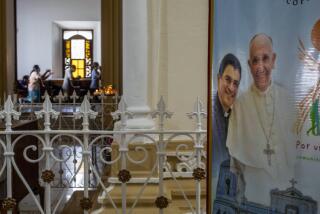Ortega Meets Opposition as Peace Accord Requires
- Share via
MANAGUA, Nicaragua — President Daniel Ortega met the leaders of Nicaragua’s opposition on Tuesday in Nicaragua’s first step toward compliance with a Central American peace agreement.
He spoke for an hour with Cardinal Miguel Obando y Bravo, the Roman Catholic archbishop who is his most prominent critic, and for 15 minutes with the leaders of all 11 legally registered opposition parties.
Under the five-nation accord signed last Friday, Nicaragua and other governments at war with insurgents are to arrange cease-fires within 90 days while taking steps to guarantee full political rights for peaceful opposition groups.
As a first step, each Central American government is required to invite the Catholic Church and opposition parties to nominate delegates to a national reconciliation commission that will monitor the peace process.
In doing so Tuesday, Ortega made the additional gesture of summoning those critics to private meetings and shaking hands with them in a televised ceremony attended by the diplomatic corps.
The apparent intent was to underline the Sandinista leader’s stated willingness to uphold his end of the peace agreement, which also seeks a halt of U.S. aid to the Nicaraguan rebels, the contras .
“We consider this a historic moment,” Ortega said. “The steps we Nicaraguans take will contribute in a substantial way to achieving a definitive peace.
“Ths situation in Central America, and particularly in Nicaragua, is extremely grave,” he added.
“Thousands of Nicaraguans have died because of the aggression the United States government maintains against Nicaragua. This ought to bring us to act more rationally and maturely to make this agreement a reality.”
The accord would require major concessions by the Sandinistas, who have pursued a Marxist-inclined revolution since fighting their way to power in 1979. They would have to hold free elections at regular intervals under international observation, end a five-year-old state of emergency, lift press censorship and allow dissidents to move freely and to hold rallies.
Three of the parties represented at Tuesday’s ceremony--the Social Christians, Social Democrats and Liberals--boycotted the 1984 presidential election on grounds that the Sandinistas unfairly restricted their campaign. This was the first time that Ortega, who won that election, has met with them since.
Erick Ramirez, the Social Christian leader, said his party will take part in the reconciliation panel. But he called on Ortega to restore political freedoms now instead of waiting for a cease-fire.
“This important thing is to look for reconciliation between the Nicaraguans who are inside the country, creating conditions for freedom and internal democracy,” Ramirez said. “That is the best antidote for the contras.”
Ortega said that he and Cardinal Obando discussed the possibility of reopening the Catholic radio station as a step toward a cease-fire, but he made no commitment. The station has been closed since January, 1986.
More to Read
Sign up for Essential California
The most important California stories and recommendations in your inbox every morning.
You may occasionally receive promotional content from the Los Angeles Times.










